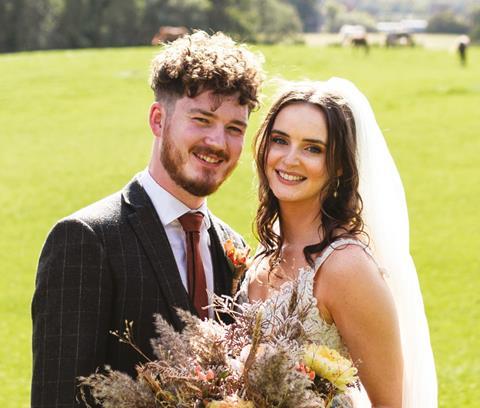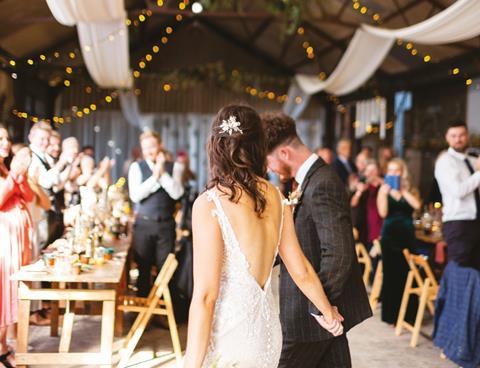An estimated 127,000 weddings were cancelled last year, as couples chose to postpone their nuptials in the face of ever-tightening Covid-19 restrictions. But speaking ahead of National Marriage Week, Charlie and Emily explain how their Christian faith inspired them to go ahead with their special day

In January 2020, as Chinese scientists were only just beginning to investigate a new strain of coronavirus, Charlie Cooke proposed to his girlfriend of 16 months, Emily. They set their wedding date for September 2020 and started to plan their dream day. “I was definitely that person who had the Pinterest board!” says Emily. “We planned a guest list of 300 people.” But their plans also had a spiritual angle: “I’ve been to a few weddings where they have been so powerful. You can’t deny the presence of God and often, the people that you can’t normally get to church will turn up for your wedding. So you have this opportunity,” she explains. “Before the pandemic, we both wanted this big day because we wanted the world to know what Jesus did in us and in our relationship.”

BUSINESS AS USUAL
At first, the couple were undeterred by Covid-19, assuming that the worst would be over by September. Emily recalls friends moving their summer weddings, or marrying legally but postponing their reception, and feeling desperately sad for them. “But I thought, with the restrictions lifting in the summer, it looked like we could be OK,” she says. Slowly, however, reality set in.
From their original list of 300 people, the couple started by halving the number of guests. “It was brutal,” says Charlie. And then with each new announcement: “We just had to keep cutting. It was like planning our wedding over and over.”
But despite rising stress levels and the rollercoaster of emotions, the couple didn’t ever seriously consider postponing their wedding. “If it came into our minds once or twice, it didn’t last long,” says Charlie. “We knew from the start, the marriage is more important than the wedding. We felt like the date that we chose was the day that [God] had planned for us to get married. Whatever it looked like, we’re going to get married, even if it was just us and a vicar.”
THE MARRIAGE IS MORE IMPORTANT THAN THE WEDDING
COUNTING THE COST
It came at a cost. Family and friends oversees could not travel to be with them, and Charlie says that when he sees or speaks to friends that were not at the wedding, he misses the connection that the shared experience should have given them.
For Emily, her biggest fear was walking down the aisle of an empty church. Letting go of her dreams for a big wedding took some time. “It was meant to be this big statement of: look how good God is! but I think I’d idolised this whole idea of the wedding day…and that was definitely stripped back. God had to do this work in my heart,” she says. One Sunday morning, as she listened to her pastor speak about entitlement, Emily had a revelation: “It was really humbling, but also made me so grateful. God just removed that sense of entitlement and it set me free. I was able to start to reimagine what a Covid wedding could look like.”
A CLOUD OF WITNESSES
“I remember crying on the phone to a friend,” she continues, “but God promised me that I was surrounded by this ‘great cloud of witnesses’ (Hebrews 12:1)…and on the wedding day, it felt like that. We shared that scripture with [our guests] and every person there filled the room with love. We didn’t feel like we lacked in any way. It felt like the presence of God literally surrounded us.”
With only 30 people allowed in the room, everyone had a part to play. “Our guests also led worship. Our guests literally married us – our pastors. My auntie came and did the evening food. People came to give,” says Emily. The result was a sense of community and intimacy that the couple say went beyond their expectations.
STRIPPED BACK BEAUTY
Experts estimate that the average wedding now costs between £18,000 and £32,000. The expense of a wedding puts many couples off tying the knot (half of unmarried men and one third of unmarried women cite cost as a reason for not marrying). But a smaller wedding can be much more affordable. This is a key message behind National Marriage Week’s 2021 theme, Naked Wedding, which encourages couples to “discover the beauty and intimacy of a small wedding”.
But the benefits can go beyond saving money. Emily says: “If I had to do it all over again, it would still be smaller than we were originally planning. I’d have a few more key people, but I would strip it back as much as possible.
“I would encourage anyone who’s planning a smaller wedding…your creativity doesn’t have to be cut short. We started getting a new dream for the wedding, which involved livestreaming and creating an event on Facebook. It forced us to be creative.”
Ultimately, the couple felt that it was the scripture God gave them as they scaled down their wedding that held them firm: “Therefore, since we are surrounded by such a great cloud of witnesses, let us throw off everything that hinders and the sin that so easily entangles. And let us run with perseverance the race marked out for us, fixing our eyes on Jesus, the pioneer and perfecter of faith” (Hebrews 12:1-2).
“Sharing and talking about our wedding reminds me that the people who get to read this are some of those witnesses,” says Emily. “They might not have been in the room, but it’s all about God anyway. It’s his marriage.”
National Marriage Week takes place from 10-16 May. Visit marriage-week.org.uk


































